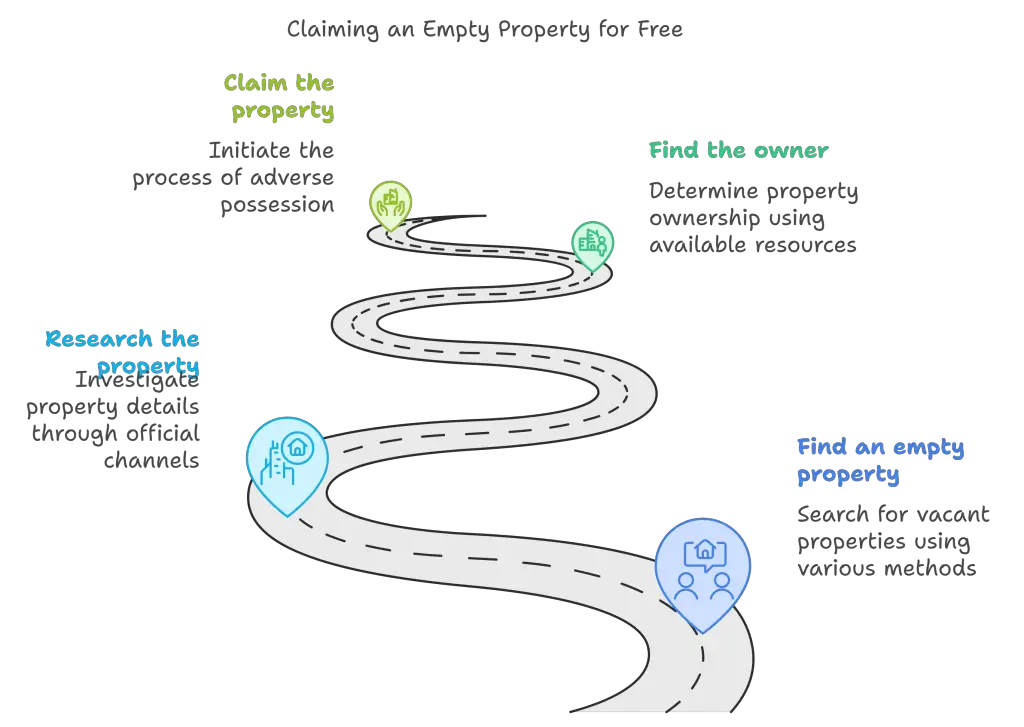In the book Free Land and Property, property expert Peter Hogan talks about the laws of adverse possession and how it is possible to take possession of abandoned properties that have no apparent owner.
Adverse possession is a legal doctrine that allows someone to take ownership of an abandoned property by inhabiting it and showing that they have the legal right to be there.
Many people know about this law, but very few know how to use it to their advantage to add properties and land to their portfolio.
In the book, Peter lays bare the methods he uses to track down suitable properties and land and shows some of his successes, including one parcel of land of around 10 acres he found IN LONDON worth a conservative £10 million today!
It sounds crazy, but when I got in touch with Peter he assured me he has done very well out of this process.
Let me tell you. We have a law in this country called Adverse Possession, which basically says that you can claim empty or abandoned land or property as your own and have full legal title to it. I have many properties and lots of land using this method. All free, and all legal.
Peter Hogan, author of Free Land and Property
How can you claim an empty property for free?
For the full process, check out the Free Land and Property book. My understanding is the start of the process looks like this:

Step 1: Find an empty property
There are a number of ways to find an empty property. One way is to check online databases. Another way is to contact your local authority.
Step 2: Research the property
To research an abandoned property for free, the most reliable method is to check the HM Land Registry. However, if the property hasn’t been registered, you may be able to find the owner’s details from your local council.
Another way to research an abandoned property is to go door-to-door and speak to neighbours.
You can also ask businesses if they have any information about the property.
Finally, you can look at government websites and databases.
Step 3: Find the owner of the property
To find the owner of an abandoned property contact the Land Registry. A search costs just £3 and should provide the owner’s contact information.
If the property isn’t registered, your next step is to try and find the owner’s details through your local council. They may have records of who owns unregistered properties in your area.
Another way to find the owner of an empty property is to ask neighbours if they know of any recent activity on the property. This method is good for properties located in large residential areas or cities. This method might not be possible in rural areas or far from other residential housing.
Step 4: Claim the property
If you want to claim an empty property for free, you can do so by adverse possession. This means that you take over ownership of the property after a certain amount of time has passed.
The amount of time needed varies depending on whether the property is registered or unregistered. For unregistered properties, you must wait 65 days for an objection to be raised. If no objection is raised, you will get full ownership after two years.
For registered properties, you must send a statement of truth to the Land Registry and apply for first registration. If the original owner objects, the matter goes to a tribunal where costs may be incurred.
Adverse possession is also known as squatters rights. It’s important to note that the original owner can object during the 12-year period. However, if you are successful in claiming an empty property through adverse possession, it will be yours free of charge!
This is just a very quick overview to give you an idea of the work involved, I highly recommend grabbing a copy of Free Land and Property to unlock the full process.
How can landlords prevent their properties from being claimed by others?
Landlords can prevent their properties from being claimed by others through proactive landlord action and housing minister collaboration. They can stay informed about property laws, conduct regular inspections, and maintain proper documentation. Collaborating with the housing minister can also help to navigate legal complexities and protect their properties.
FAQs
How can you use an empty property or claimed land?
1. You can use an empty property as a rental property.
An empty property can be a great option for landlords looking for an affordable investment. These properties are usually in need of repair and refurbishment.
With some work, an empty property can be turned into a comfortable rental unit that can generate income for the landlord.
2. You can build on the land.
This will depend on the location and zoning, but assuming you have the option to build on the claimed land you can develop the site into new housing, shopping or office space, either to rent out or to sell.
3. You can use an empty property as a filming location.
A somewhat unusual suggestion, but production companies are always looking for places to film TV shows and films, often paying a considerable amount to the property owner to be able to redecorate to fit the theme requirements and to cover the cost of restoring the property from any damage caused during filming.
4. You can use an empty property as a summer home.
If you happen to gain a property in a different area of the country you could rennovate and use it as either an alternative home for yourself, or as a holiday rental.
What is an empty property?
An empty property is a property that is not occupied by anyone. It can be a commercial or residential property.
Empty properties are risky investments and can quickly lose value as they often need major repairs and don’t guarantee a return on this investment.
How do you claim an empty property?
Claiming an empty property in the UK is legal, and you may have some rights if the owner takes out a civil action. If you have occupied the property continuously for at least 10 years or 12 years, depending on the type of property, you may be able to claim it as your own. You must prove that the owner did not give permission for you to occupy the property. There are a number of ways to find available properties, depending on your needs. Grab a copy of Free Land and Property for full details.
What are the benefits of claiming an empty property?
There are many benefits to claiming an empty property, including substantial VAT reductions, saving money on building contract sums, and increased council tax discounts. Empty properties represent a wasted resource, and can often be restored to use quickly and easily. This can free up funds for the owner to put towards other projects, as well as help to improve the local area.
What are the risks of claiming an empty property?
- Claim settlements for an empty property can be difficult to receive, and may involve risks.
- Not understanding your insurance responsibilities can lead to loss of money and missed rental income.
- It is not illegal to squat an unoccupied property, but it is against civil law.
- You need to have property insurance which specifically covers empty properties.
- Keeping your property safe and secure is essential in order to receive a full settlement from your insurer.
- Claiming an empty property can be free, but it is possible that the owner will take legal action against you.
- If you occupy an empty property for more than a year, you may be able to claim ownership.
- It is important to prove that the property was not rented out to you, otherwise you will have to pay back the original owner
- The house may be dangerous! There could be a reason the house is empty for example if its in a state of disrepair (contaminated with asbestos for example).
What is the law of adverse possession?
Adverse possession is a legal doctrine that allows someone to take ownership of an abandoned property by inhabiting it and showing that they have the legal right to be there. If the property has a registered owner, you must send them a form and statement of truth before claiming the property. If there is no registered owner, you will get full ownership after two years if no contact is made from the owner.
- Private landlordism faces end under new Green Party policy - October 6, 2025
- Should You Take Out Landlord Insurance? - October 6, 2025
- Top Rental Demand Factors for 2025 - October 4, 2025


